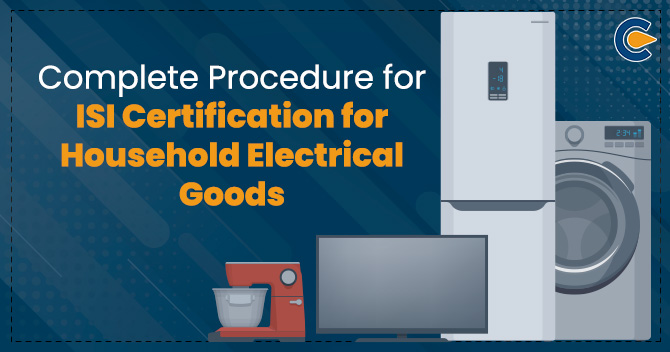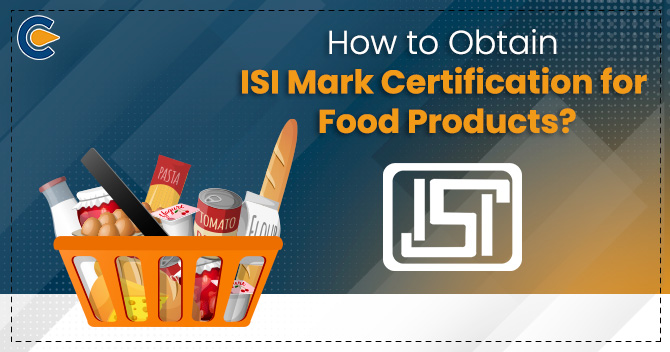There is a wide range of electrical goods that are used in a daily household by Indian customers. Indian Government has made it compulsory to have ISI Certification for all these household electrical products as it proves that these products are safe for use. This blog is going to give you all information related to the procedure for ISI Certification for Household Electrical Goods.
Overview of ISI Certification
Let’s understand the ISI Certification before knowing the procedure for ISI Certification. The ISI Certification is required to ensure the quality of products that are available for sale in the Indian markets. The ISI is sued as a short form of the Indian Standards Institute.
Manufacturers of Household Electrical Goods have to obtain this ISI Certification from the Bureau of Indian Standards (BIS) to sell them in Indian markets. ISI Certification Mark on any product ensures that the manufacturing of such product has gone through high-quality checks and the manufacturer has followed all the regulations set by the BIS. This ISI Certification Mark has been one of our country’s most recognised certification marks since 1955.
Benefits of ISI Certification
Benefits of going through the complete procedure for ISI Certification and obtaining the same for household electrical goods are as follows:
- It certifies the quality of such household electrical goods to its customers.
- ISI mark on household electrical goods guarantees longer shelf life with better performance.
- Enhancement of quality control, standardisation, safety and reliability of these household electrical products its customers.
- Deduction in product rejection and losses in businesses of such products
- In case of an unsatisfied customer of a product with ISI Certification Mark, the company gives a new and proper product in return.
Essential pointers related to the procedure for ISI Certification for Household Electrical Goods
Essential pointers to know before starting the procedure for ISI Certification for Household Electrical Goods:
- The Bureau of Indian Standards (BIS) regulates and monitors the manufacturing of these household electrical products.
- An unsatisfied customer may file a complaint to BIS if the product he purchased is not of good quality. Bureau of Indian Standards (BIS) Officer requires three months to inspect and verify a complaint filed against any manufacturer of such goods/products.
- A seller should provide details of the ISI Certification Mark on every invoice of the household electrical products.
ISI Certification Schemes for Household Electrical Goods
Before going through the procedure for ISI Certification, let’s know the Certification Schemes provided by the ISI. ISI Certification has stated different schemes: the Domestic Manufacturers Certification Scheme, the Foreign Manufacturers Certification Scheme, and the ECO Mark Scheme. The thorough discussion on both of them is as follows:
ISI Certification Schemes for Domestic Manufacturers:
Under ISI Certification Schemes for Domestic Manufacturers, an applicant submits the application form to the BIS Authority online. After the submission of the application by the applicant, a preliminary evaluation is conducted by the corresponding BIS officer. The manufacturer’s place is checked for its capability, qualified and technical personnel and samples for independent testing. Grant of Certification and licensing is considered after the sample products pass the regular testing with respective Indian standards provided by the Authority. The process takes approximately four months and six months in the case of all India’s first licenses. There are also specific laboratories prescribed by BIS which test the products, and then these reports are submitted along with the application form for the ISI Certification. With verification and testing, the acceptable certification or license is granted too.
ISI Certification Schemes for Foreign Manufacturers:
Under ISI Certification Schemes for Foreign Manufacturers, the ISI certification is granted to foreign manufacturers for using the Indian Certification mark on their household electrical products except for such electronic products or Goods as notified by the Department of Electronics and Information Technology (DeitY)[1].
ECO Mark Scheme:
Under ECO Mark Scheme, ISI Certification is granted to such specified products only that are Environment friendly.
Required Documents for ISI Certification for Household Electrical Goods
Following are important documents one must have before starting the procedure for ISI Certification for Household Electrical Goods:
- Address Proof of manufacturing unit/factory
- Documents to prove the legal identity of the company (MOA and AOA)
- MSME Registration Certificate
- Location plan
- Regulatory Authority’s Certificate Copy
- Consent Letter from BIS recognised/certified Lab
- A detailed list of raw materials used or going to be used with copies of Test Certificates.
- A detailed list of all the Household Electrical Goods used for testing
- Test Report of the product’s sample by a BIS Certified Lab
- Copy of Quality manual and plan
- Quality Assurance System Testing followed by manufacturing unit or factory.
- Flow chart of the manufacturing process
- Details of machinery installed.
- Detailed factory layout plan
- Product drawing
- Company’s bank statement
- Recent Utility Bills
- Packaging details, including product size, quantity, storage facility, etc.
- Declaration
- Trademark Registration Certificate (if available)
- State Pollution Control Board Certificate (if available)
- Detailed information of all the workers and staff
- Qualification Certificate and Appointment Letter of QC Person
Procedure for ISI Certification for all Household Electrical Goods
Following is the step-by-step procedure for ISI Certification for Household Electrical Goods in India:
- Selection of the Product Code:
An applicant must find and choose an ISI product code for their household electrical product.
- Filing of the Application:
The next step after choosing the right product code is the filing of an application. The application is filed in the prescribed Form-V for getting ISI Certification along with all the required documents and requisite fees. Again, the applicant pays audit fees in addition to the Registration fees for further inspection.
- Inspection by BIS Officer:
Further, the next step in the procedure for ISI Certification is the household electrical goods manufacturing factory inspection and also factory premises by the authorised BIS Officer. The BIS Officer and its inspection team visit the factory and examine the premises along with the manufacturing process and quality control of the applicant’s factory. The BIS Officer and its inspection team collect samples and send the samples for testing in a BIS recognised and certified Lab.
- Product’s Sample Report:
The applicant gets the report of the product’s sample from such BIS-certified Lab and submits the same to the BIS.
- Issue of ISI Certificate:
Once the complete procedure for ISI Certification with verification of all documents and reports is completed, then the BIS Authority issues ISI Certificate.
Validity of ISI Certification
After following the proper procedure for ISI Certification, one gets the Certification /License for a period of one year for the Household Electrical Goods. The same can be renewed for a maximum of two years subject to periodic inspections, factory tests and independent samples received at the factory and from the market. To renew the original ISI Certificate, the applicant must file an application to a certified Practicing Chartered Accountant (CA).
Penalty for Misusing an ISI Certification Mark
In case a producer or manufacturer of Household Electrical Products/Goods counterfeits a registered ISI Certification Mark or violates any of the condition highlighted by BIS, then such producer or manufacturer of these products are held liable for a penalty of fine of Rs. 50,000/- and imprisonment for up to 1 year.
Conclusion
ISI Certification is mandatory for manufacturers of Household Electrical Goods to ensure their customers about the quality of their products/goods. The procedure for ISI Certification is very simple and includes testing of products of manufacturers from the BSI verified labs. The ISI Certification marks of the Household Electrical Goods ensure that they are safe to use.
Read our Article:Overview of the Benefits of ISI Certification











